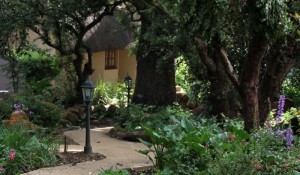June is an interesting gardening month with the shortest day and the longest night falling on June 21st. Granny Mouse Country House & Spa’s landscaper Sonja Van Der Merwe says, “The chilly nights and frosts will most likely slow down plant growth dramatically, making June a much quieter time for gardeners, more so in the colder interior regions, whereas in the warmer regions, planting is a lot easier. The sap of plants will also slowly start to rise after June 21st and many gardeners advocate delaying pruning until after this date, believing that their plants respond better afterwards.”
A few tips for winter planting she says, includes preparation. Follow these few tips and you are sure to be on your way to creating beautiful gardens like the ones Van Der Merwe upkeeps at Granny Mouse – which are stunning all year round!
- Ensure that your gutters are clean and check that all your standard plants and young trees are securely staked and tied, and that old ties are not cutting into the bark of your plants.
- Remember to water your winter and spring flowering shrubs and trees regularly.
Van Der Merwe also adds in a few types of plants to set into the soil during the colder months which include early-flowering camellias as they will be in bloom, hardy perennials, as their roots keep on growing in winter and they will be well established by summer. Clivias are also an option, but they must be kept more on the dry side and remove winter grass (Poa annua) from your lawn and beds before it sets seed. On the vegetable side of things, she suggests that in the Lowveld and Coastal regions of KZN, vegetables can be planted as it is the best time for growth and adds, “in all but the coldest regions you can still sow hardy root vegetables like parsnip, carrot, radish and turnip. In cold inland regions June and July are not good months to sow seeds of vegetables because the soil is too cold for good germination and growth”.
To plan for the upcoming month of July, gardeners can get all their rose pruning done. In the subtropical regions roses can produce flowers until September, but it is best to encourage a period of rest in June and July, by reducing watering and not feeding. “July is traditionally the time to transplant roses which are growing in the wrong place as well as to plant new roses and to re-pot container grown plants,” she adds.
For June, Van Der Merwe suggests that transplanting conifers should be done and sprayed with Wilt-Pruf before moving them. “Remember to treat your conifers for the cypress aphid during the winter months and water them deeply every ten days,” she adds.
This winter, if the soil is very cold and wet, and unsuitable for gardening then one tip Van Der Merwe suggests is to cuddle up with a hot cup of your favourite drink and plan your summer garden and any improvements you wish to implement when you get the chance.


